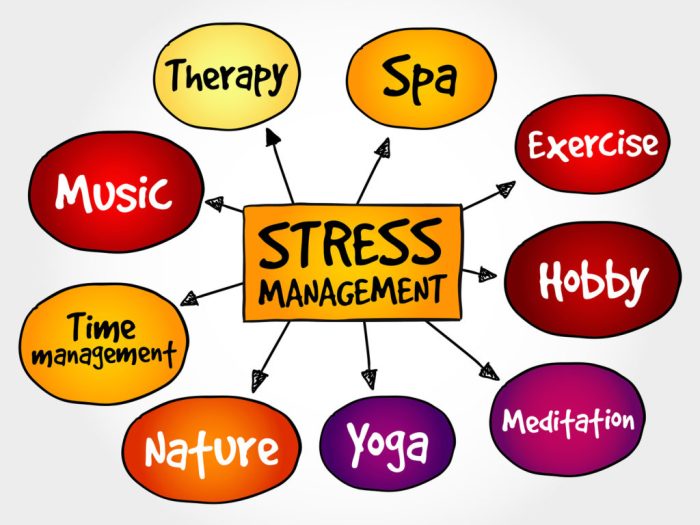Stress management, a crucial aspect of daily life, is all about finding balance and inner peace amidst the chaos. Get ready to dive into a world where relaxation techniques, mindfulness, and healthy lifestyle choices are key players in the game of stress reduction.
Definition of Stress Management

Stress management is the practice of techniques and strategies to help individuals cope with and reduce the negative effects of stress in their lives. It is important because chronic stress can have detrimental effects on both physical and mental health, leading to issues like anxiety, depression, and even heart disease.
Examples of Different Stress Management Techniques
- Deep breathing exercises
- Mindfulness meditation
- Physical exercise
- Journaling
- Time management
Benefits of Practicing Stress Management in Daily Life
- Improved mental health and emotional well-being
- Enhanced focus and productivity
- Better sleep quality
- Reduced risk of chronic diseases
- Enhanced overall quality of life
Common Causes of Stress: Stress Management
Stress can stem from various sources in our daily lives, impacting both our physical and mental well-being. It is essential to identify these common causes to effectively manage and reduce stress levels.
Work and Academic Pressure, Stress management
- Meeting deadlines
- High workload
- Pressure to perform well
Relationship Issues
- Conflicts with family or friends
- Breakups or divorce
- Lack of communication
Financial Problems
- Debt and financial insecurity
- Unemployment or underemployment
- Inability to meet financial obligations
Health Concerns
- Chronic illness or disability
- Injuries or accidents
- Poor lifestyle habits affecting health
Life Changes
- Moving to a new city or country
- Starting a new job or school
- Major life events like marriage or childbirth
Strategies for Stress Reduction
In order to effectively manage stress, it is important to incorporate various relaxation techniques, exercise routines, and create a stress-free environment at home or work.
Relaxation Techniques
- Deep breathing exercises: Inhale deeply through your nose, hold for a few seconds, and exhale slowly through your mouth. Repeat this process to calm your mind and body.
- Meditation: Find a quiet space, close your eyes, and focus on your breath. Allow thoughts to come and go without judgment, promoting inner peace and relaxation.
- Progressive muscle relaxation: Tense and then relax each muscle group in your body, starting from your toes and working your way up. This can help release physical tension and promote relaxation.
Importance of Exercise
Regular physical activity is essential for managing stress as it helps release endorphins, the body’s natural mood lifters. Exercise can also improve sleep quality, boost self-esteem, and reduce anxiety levels.
Creating a Stress-Free Environment
- Declutter your space: A clean and organized environment can promote a sense of calm and reduce feelings of overwhelm.
- Set boundaries: Learn to say no to tasks or commitments that add unnecessary stress to your life. Prioritize self-care and personal time.
- Practice mindfulness: Stay present in the moment and focus on one task at a time. Avoid multitasking, which can increase stress levels.
Mindfulness and Meditation
When it comes to managing stress, mindfulness and meditation play a crucial role in helping individuals find peace and calm in the midst of chaos.
Benefits of Mindfulness
- Improved focus and concentration
- Reduced anxiety and depression
- Enhanced self-awareness and emotional regulation
Types of Meditation
Meditation comes in various forms, each offering unique benefits for stress reduction:
- Mindfulness Meditation: Focuses on being present in the moment, observing thoughts and feelings without judgment.
- Transcendental Meditation: Involves silently repeating a mantra to achieve a state of relaxed awareness.
- Loving-Kindness Meditation: Cultivates feelings of compassion and empathy towards oneself and others.
Healthy Lifestyle Choices

Maintaining a healthy lifestyle is crucial for managing stress effectively. Making the right choices when it comes to nutrition, sleep, and leisure activities can significantly impact your stress levels.
Nutrition and Stress Levels
Proper nutrition plays a key role in managing stress levels. Eating a balanced diet rich in fruits, vegetables, whole grains, and lean proteins can provide your body with the necessary nutrients to combat stress. Avoiding excessive caffeine, sugar, and processed foods can also help regulate your mood and energy levels.
Importance of Sleep for Stress Management
Getting enough quality sleep is essential for stress management. Lack of sleep can lead to increased stress levels, irritability, and difficulty concentrating. Aim for 7-9 hours of sleep each night to allow your body and mind to rest and recharge, promoting overall well-being.
Benefits of Hobbies and Leisure Activities
Incorporating hobbies and leisure activities into your daily routine can be a great way to unwind and reduce stress. Engaging in activities you enjoy, whether it’s reading, painting, gardening, or playing a musical instrument, can help distract your mind from stressors and provide a sense of fulfillment and relaxation.